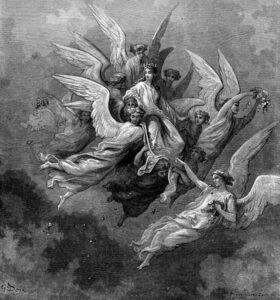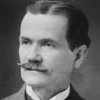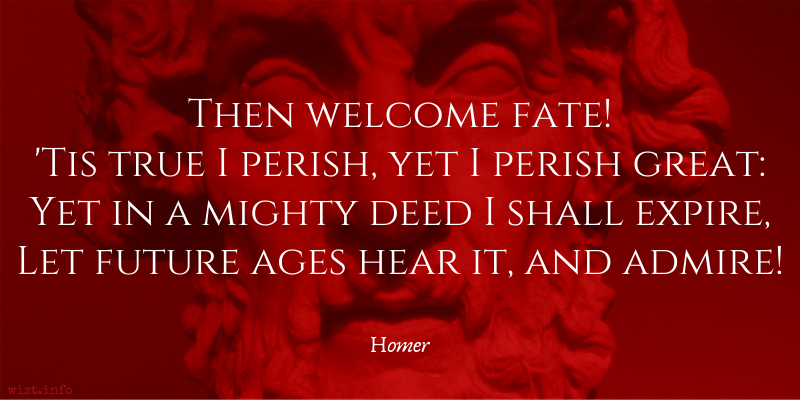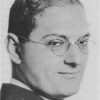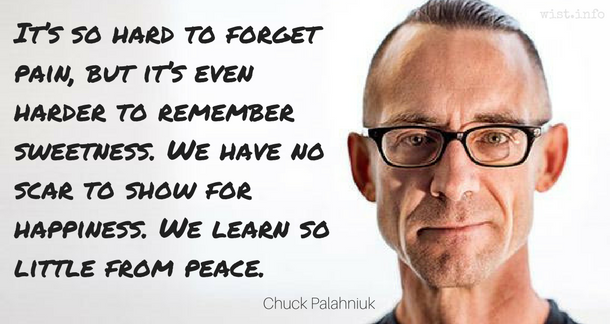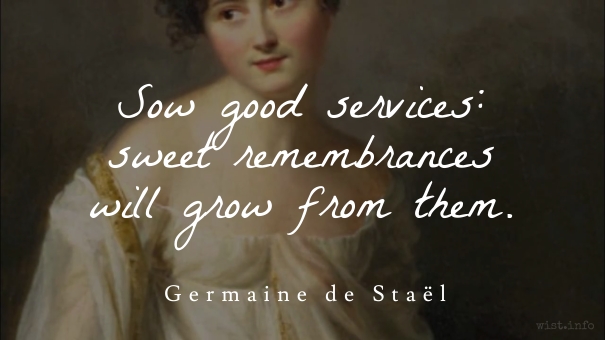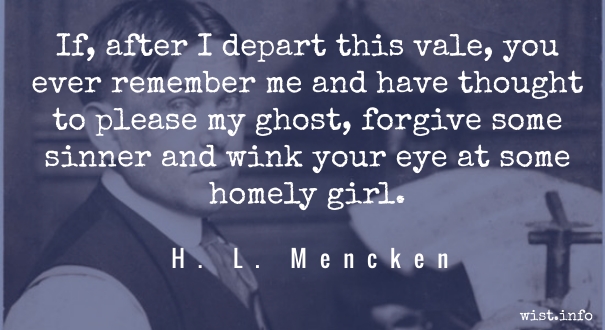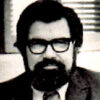What is the end of Fame? ’tis but to fill
A certain portion of uncertain paper:
Some liken it to climbing up a hill,
Whose summit, like all hills, is lost in vapour;
For this men write, speak, preach, and heroes kill,
And bards burn what they call their “midnight taper,”
To have, when the original is dust,
A name, a wretched picture, and worse bust.
Quotations about:
remembrance
Note not all quotations have been tagged, so Search may find additional quotes on this topic.
Not one drop of blood
is left inside my veins that does not throb:
I recognize signs of the ancient flame.[Men che dramma
di sangue m’è rimaso, che non tremi;
conosco i segni de l’antica fiamma.]Dante Alighieri (1265-1321) Italian poet
The Divine Comedy [Divina Commedia], Book 2 “Purgatorio,” Canto 30, l. 46ff (3.46-68) (1314) [tr. Musa (1981)]
(Source)
Dante, on seeing his long-lost love, Beatrice, repeating to Virgil the lines he had given Dido (Aeneid, 4.23) about how she felt the stirring of long-dead passion upon seeing Aeneas: "Agnosco veteris vestigia flammae" ("I know the traces of the ancient flame" [tr. Kline (2002)]).
(Source (Italian)). Alternate translations:
There is no dram of blood,
That doth not quiver in me. The old flame
Throws out clear tokens of reviving fire.
[tr. Cary (1814)]
There is not one drop
Of blood within me trembling but became:
I know the tokens of the ancient fame.
[tr. Bannerman (1850)]
Not a drachm
Of blood remains in me, that does not tremble;
I know the traces of the ancient flame.
[tr. Longfellow (1867)]
Less than a dram of blood remains to me which trembles not; I recognise the signs of the ancient flame.
[tr. Butler (1885)]
Rests within my frame
No dram of blood that does not tremble now;
I know the symptoms of the olden flame.
[tr. Minchin (1885)]
Less than a drachm of blood remains in me that doth not tremble; I recognize the signals of the ancient flame.
[tr. Norton (1892)]
Less than a drachm of blood
is left in me that trembleth not; I recognise
the tokens of the ancient flame.
[tr. Okey (1901)]
Not a drop of blood is left in me that does not tremble; I know the marks of the ancient flame.
[tr. Sinclair (1939)]
Scarce one drop remains
Of blood in me that trembles not: by this
I recognize the old flame within my veins.
[tr. Binyon (1943)]
There is scarce a dram
That does not hammer and throb in all my blood;
I know the embers of the ancient flame.
[tr. Sayers (1955)]
There is not within me
one drop of blood unstirred. I recognize
the tokens of the ancient flame.
[tr. Ciardi (1961)]
Less than a drop of blood
Is left in me, that is not trembling:
I know the signs of the ancient flame.
[tr. Sisson (1981)]
I am left with less
than one drop of blood that does not tremble:
I recognize the signs of the old flame.
[tr. Mandelbaum (1982)]
There is a barely a drop of blood in me that does not tremble: I know the tokens of the ancient flame.
[tr. Kline (2002)]
Less than a dram of blood is left me that is not trembling: I recognize the signs of the ancient flame!
[tr. Durling (2003)]
There is not one gram
of blood in me that does not tremble now.
I recognize the signs of ancient flame.
[tr. Kirkpatrick (2007)]
Not a single drop of blood
remains in me that does not tremble --
I know the signs of the ancient flame.[tr. Hollander/Hollander (2007)]
There isn't a single drop of whatever blood
Still flows in my veins that isn't shaking from fear:
I recognize the signs of that ancient fire.
[tr. Raffel (2010)]
“Pooh, promise you won’t forget about me, ever. Not even when I’m a hundred.”
Pooh thought for a little.
“How old shall I be then?”
“Ninety-nine.”
Pooh nodded.
“I promise,” he said.A. A. Milne (1882-1956) English poet and playwright [Alan Alexander Milne]
The House at Pooh Corner, ch. 10 [Christopher Robin and Pooh] (1928)
(Source)
Possibly the inspiration of the spurious Pooh quotation:
If you live to be a hundred, I want to live to be a hundred minus one day, so I never have to live without you.
For more discussion about this and related quotes, see May You All Live Forever. May I Live Forever Less A Day – Quote Investigator®.
This thing of being a hero, about the main thing to it is to know when to die. Prolonged life has ruined more men that it ever made.
When writers die they become books, which is, after all, not too bad an incarnation.
Childhood is a thing that happens so early you don’t forget it. Everything else you grow out of, but you never recover from childhood.
Beryl Bainbridge (1932-2010) English novelist
“Beryl Bainbridge and Her Tenth Novel,” interview by Willa Petschek, New York Times (1981-03-01)
(Source)
Here rests Erotion’s all-too-hurried shade,
dispatched in her sixth winter by Fate’s crime.
Make yearly offerings to her tiny ghost,
whoever rules this plot after my time.
So may your home and household last for years
with nothing but this stone to call for tears.[Hic festinata requiescit Erotion umbra,
Crimine quam fati sexta peremit hiems.
Quisquis eris nostri post me regnator agelli,
Manibus exiguis annus iusta dato:
Sic lare perpetuo, sic turba sospite solus
Flebilis in terra sit lapis iste tua.]Martial (AD c.39-c.103) Spanish Roman poet, satirist, epigrammatist [Marcus Valerius Martialis]
Epigrams [Epigrammata], Book 10, epigram 61 (10.61) (AD 95, 98 ed.) [tr. McLean (2014)]
(Source)
See also his epitaph to Erotion at 5.34.
(Source (Latin)). Alternate translations:
In her sixth spring, behold Erotion laid:
If heaven we might arrain, an early shade.
Bland successor, whoe'er shall rule this field,
To my blest shadeling annual honors yield.
So may thy verdant vine perennial stand:
So may her teeming shoots o'erspred the land.
So may'st thou never feel a tendrel tor'n:
And may this single stone in thy dominion mourn.
[tr. Elphinston (1782), Book 4, ep. 20]
Underneath this greedy stone,
Lies little sweet Erotion;
Whom the fates, with hearts as cold,
Nipt away at six years old.
Thou, whoever thou mast be,
That hast this small field after me,
Let the yearly rites be paid
To her little slender shade;
So shall no disease or jar
Hurt thy house, or chill thy Lar;
But this tomb here be alone,
The only melancholy stone.
[tr. Hunt (1819)]
Here reposes Erotion in the shade of the tomb that too early closed around her, snatched away by relentless Fate in her sixth winter. Whoever you are that, after me, shall rule over these lands, render annual presents to her gentle shade. So, with undisturbed possession, so, with your family ever in health, may this stone be the only one of a mournful description on your domain.
[tr. Bohn's Classical (1859)]
Here lies Erotion in the shade
Of foliage planted newly.
In her sixth winter did she fade,
Cut off by fate unduly.
Thou, whosoe'er thou be, to whom
Ere long these fields I render,
The annual offerings at her tomb
Discharge; they are but slender.
So, son succeeding sire, from thee
No victims death shall borrow:
But on thy land this stone shall be
The only mark of sorrow.
[tr. Webb (1879)]
Here lies Erotion, whom at six years old
Fate pilfered. Stranger (when I too am cold
Who shall succeed me in my rural field),
To this small spirit annual honours yield.
Bright be thy hearth, hale be thy babes, I crave,
And this, in thy green farm, the only grave.
[tr. Stevenson (1883)]
Here in too early gloom rests Erotion whom, by crime of Fate, her sixth winter laid low. Whoe'er thou shalt be, the lord after me of my little field, to her tiny ghost pay thou year by year thy rites. So may they roof-tree continue, so thy household live unscathed, and in thy fields this gravestone alone call forth a tear!
[tr. Ker (1919)]
Here sleeps the body of the little maid,
Erotion,
Ere her sixth winter fate had called her shade
To hasten on;
Whoe’er thou art who after me shall own
This tiny plot,
Lay year by year the dues upon her stone;
Forget her not.
So shall thy house endure nor suffering know,
And this remain
The only sign and monument of woe
On thy domain.
[tr. Pott & Wright (1921)]
Here lies Erotion at untimely date,
In his sixth year cut down by cruel fate.
You, my successor in this little field,
To his poor ashes annual tribute yield.
So prosper house and home, and on this land
No other monument of mourning stand.
[tr. Francis & Tatum (1924), ep. 556]
Here lies our Erotion
in the untimely shadow of a gravestone.
Her sixth winter hurried her on
to an end that was destined.
I address the future owner of this land,
and ask his yearly reverence, made
to this slender shade:
May your household gods
forever flourish and your whole household enjoy
a happy life --
and may this single stone
be the one place for grief
on your land alone.
[tr. Bovie (1970)]
Here, six years old, by Destiny's crime
Made a ghost before her time,
Erotion lies. Whoever you be
Next lord of my small property,
See that the due of death are paid
Annually to her slender shade:
So may your hearth burn bright and strong,
Your household thrive, yourself live long,
And this small stone, throughout the years,
Remain your only cause for tears.
[tr. Michie (1972)]
Here lies Erotion's hastened shade, whom by crime of Fate her sixth winter slew. Make annual offering to her tiny ghost, whoever after me shall be ruler of my plot of land. So may your home continue and your household live on and this stone be the only thing on your property to call for tears.
[tr. Shackleton Bailey (1993)]
Here in premature gloom Erotion rests
whose sixth winter now will last forever.
Whoever tends this small field after me,
pay each year homage to her slender ghost:
then you will prosper here and never
weep, except this stone bring her to memory.
[tr. Matthews (1995)]
While rivers run into the deep,
While shadows o’er the hillside sweep,
While stars in heaven’s fair pasture graze,
Shall live your honour, name, and praise,
Whate’er my destined home.[In freta dum fluvii current, dum montibus umbrae
lustrabunt convexa, polus dum sidera pascet,
semper honos nomenque tuum laudesque manebunt,
quae me cumque vocant terrae.]Virgil (70-19 BC) Roman poet [b. Publius Vergilius Maro; also Vergil]
The Aeneid [Ænē̆is], Book 1, l. 607ff (1.607-610) [Aeneas] (29-19 BC) [tr. Conington (1866)]
(Source)
Expressing undying gratitude to Dido for taking him and his soldiers in. He will then marry Dido, desert her, and leave her to her suicide. At least he gets haunted by her ghost in the Underworld.
(Source (Latin)). Alternate translations:
Whilst convex'd hills have shadows, to the maine,
Whilst rivers run, whilst poles the stars sustaine,
Thy honour; name, and same, shall last, what land
So-ever me invites.
[tr. Ogilby (1649)]
While rolling rivers into seas shall run,
And round the space of heav'n the radiant sun;
While trees the mountain tops with shades supply,
Your honour, name, and praise shall never die.
Whate'er abode my fortune has assign'd,
Your image shall be present in my mind
[tr. Dryden (1697)]
While the rivers to the sea
Shall run, -- while mountain shadows move around
Their sides, -- and while the heavens shall feed the
stars. So long thy honor, and thy name and praise
Shall last, whatever lands may call me hence.
[tr. Cranch (1872)]
While rivers run into the sea, while the mountain shadows move across their slopes, while the stars have pasturage in heaven, ever shall thine honour, thy name and praises endure in the unknown lands that summon me.
[tr. Mackail (1885)]
Now while the rivers seaward run, and while the shadows stray
O'er hollow hills, and while the pole the stars is pasturing wide,
Still shall thine honour and thy name, still shall thy praise abide
What land soever calleth me.
[tr. Morris (1900)]
O, while the rivers run
to mingle with the sea, while shadows pass
along yon rounded hills from vale to vale,
and while from heaven's unextinguished fire
the stars be fed -- so long thy glorious name,
thy place illustrious and thy virtue's praise,
abide undimmed. -- Yet I myself must go
to lands I know not where.
[tr. Williams (1910)]
While rivers run into the sea, while on the mountains shadows move over the slopes, while heaven feeds the stars, ever shall thy honour, thy name, and thy praises endure, whatever be the lands that summon me!
[tr. Fairclough (1916)]
While rivers run to sea, while shadows move
Over the mountains, while the stars burn on,
Always, your praise, your honor, and your name,
Whatever land I go to, will endure.
[tr. Humphries (1951)]
So long as rivers run to the sea, and shadows wheel round
The hollows of the hills, and star-flocks browse in the sky,
Your name, your fame, your glory shall perish not from the land
Wherever I am summoned to go.
[tr. Day-Lewis (1952)]
While rivers run into the sea and shadows
still sweep the mountain slopes and stars still pasture
upon the sky, your name and praise and honor
shall last, whatever be the lands that call me.
[tr. Mandelbaum (1971), l. 852ff]
So long as brooks flow seaward, and the shadows
Play over the moutnain slopes, and highest heaven
Feeds the stars, your name and your distinction
Go with me, whatever lands may call me.
[tr. Fitzgerald (1981), l. 828ff]
While rivers run into the sea, while shadows of mountains move in procession round the curves of valleys, while the sky feeds the stars, your honour, your name, and your praise will remain for ever in every land to which I am called.
[tr. West (1990)]
Your honour, name and praise will endure forever,
whatever lands may summon me, while rivers run
to the sea, while shadows cross mountain slopes,
while the sky nourishes the stars.
[tr. Kline (2002)]
While rivers run to the sea, while shadows
Move over mountainsides, while the sky
Pastures the stars, ever shall your honor,
Your name, and your praises endure,
Whatever the lands that summon me.
[tr. Lombardo (2005)]
So long as rivers run to the sea, so long as shadows
travel the mountain slopes and the stars range the skies,
your honor, your name, your praise will live forever,
whatever lands may call me to their shores
[tr. Fagles (2006), l. 727]
While rivers flow to the seas and shadows cross the moutnain slopes, while sky pastures the stars, your honor and your name and praise will last for me, whatever country calls.
[tr. Bartsch (2021)]
Memory is a crazy woman that hoards colored rags and throws away food.
Austin O'Malley (1858-1932) American ophthalmologist, professor of literature, aphorist
Keystones of Thought (1914)
(Source)
Write Injuries in Dust, Benefits in Marble.
Benjamin Franklin (1706-1790) American statesman, scientist, philosopher, aphorist
Poor Richard’s Almanack, “August” (1747)
(Source)
As with so much else of Franklin's, this phrase is not without earlier forms, e.g.: Thomas More, History of King Richard III (1513):
For men use, if they have an evil turn, to write it in marble; and whosoever does us a good turn, we write it in dust.
Or see Shakespeare, Henry VIII 4.2.45-46 (1613):
Men's evil manners live in brass, their virtues
We write in water.
Variants include "but kindnesses in marble" or "but kindness in marble."
This also shows up as a French saying in various forms:
- "Ecrivez les injures sur le sable, mais les bienfaits sur le marbre."
- "Écrivez les injures sur le sable, gravez les bienfaits sur le marbre."
Fortunate pair!
If there be any power
within my poetry, no day shall ever
erase you from the memory of time.[Fortunati ambo! Siquid mea carmina possunt,
nulla dies umquam memori vos eximet aevo.]Virgil (70-19 BC) Roman poet [b. Publius Vergilius Maro; also Vergil]
The Aeneid [Ænē̆is], Book 9, l. 447ff (9.447-448) (29-19 BC) [tr. Mandelbaum (1971), l. 592ff]
(Source)
On the deaths of Nisus and Euryalus, lying after battle in each other's arms.
The 9/11 Memorial and Museum in New York City (see image) uses a variant of this ("No day shall erase you from the memory of time"), though some have questioned the contextual propriety.
(Source (Latin)). Alternate translations:
You, if my verse have power, be ever blest,
No age shall you forget ....
[tr. Ogilby (1649)]
O happy friends! for, if my verse can give
Immortal life, your fame shall ever live.
[tr. Dryden (1697)]
Happy pair! if my verses can aught avail, no day shall ever erase you from the records of time.
[tr. Davidson/Buckley (1854)]
Blest pair! if aught my verse avail,
No day shall make your memory fail.
[tr. Conington (1866)]
Ay, happy pair! If aught my verse can do,
No lapse of time shall ever dim your fame,
[tr. Cranch (1872), l. 551]
Happy pair! if my verse is aught of avail, no length of days shall ever blot you from the memory of time.
[tr. Mackail (1885)]
O happy twain, if anywise my song-craft may avail,
From out the memory of the world no day shall blot your tale.
[tr. Morris (1900)]
O happy pair! if aught my verse ensure,
No length of time shall make your memory wane,
[tr. Taylor (1907), st. 57, ll. 510-11]
Heroic pair and blest! If aught I sing
have lasting music, no remotest age
shall blot your names from honor's storied scroll.
[tr. Williams (1910), l. 446ff]
Happy pair! If aught my verse avail, no day shall ever blot you from the memory of time.
[tr. Fairclough (1918)]
Fortunate boys!
If there is any power in my verses,
You will not be forgotten in time and story.
[tr. Humphries (1951)]
Ah, fortunate pair! if my poetry has any influence,
Time in its passing shall never obliterate your memory.
[tr. Day-Lewis (1952)]
Fortunate, both! If in the least my songs
Avail, no future day will ever take you
Out of the record of remembering Time.
[tr. Fitzgerald (1981), l. 633ff]
Fortune has favored you both! If there is any power in my poetry, the day will never come when time will erase you from the memory of man.
[tr. West (1990)]
Happy pair! If my poetry has the power, [...]
no day will raze you from time’s memory.
[tr. Kline (2002)]
Happy pair,
If my poetry has any power
Never shall you be blotted from memory.
[tr. Lombardo (2005)]
How fortunate, both at once!
If my songs have any power, the day will never dawn
that wipes you from the memory of the ages.
[tr. Fagles (2006)]
Lucky pair! If my song has any power, no day will steal you from time's memory.
[tr. Bartsch (2021)]
Life brings no greater grief
Than happiness remembered in a time
Of sorrow.[Nessun maggior dolore
Che ricordarsi del tempo felice
Ne la miseria.]Dante Alighieri (1265-1321) Italian poet
The Divine Comedy [Divina Commedia], Book 1 “Inferno,” Canto 5, l. 121ff (5.121-123) [Francesca] (1309) [tr. James (2013), l. 141ff]
(Source)
Francesca de Rimini is responding to Dante's request to speak of her love affair while in the middle of being punished for it. It is a true (if slanted) tale that occurred when Dante was a young man. Francesca da Polenta wed the crippled Giovanni Malatesta de Rimini, but fell in adulterous love with his brother, Paolo. Upon discovery of their affair, Giovanni killed them both. This was a local scandal, and would have been lost to time if Dante had not recorded it here. He relegates the lovers to the "least" eternal punishment in Hell, in the circle of carnal sins -- while Giovanni (who was still alive when this was written) is doomed to a lower circle for the murder (treachery to kindred). (More info.)
Inspiration for this particular phrase has been credited to many sources: Wisdom 11:11-12, Boethius (Consolation of Philosophy, 2.4.3-6), and Pindar (Pythian 4.510-512) are the most common. Augustine (Confessions 10.14) and Thomas Aquinas have also been cited.
(Source (Italian)). Alternate translations:
No greater grief assails us [...]
Than in unhappy hours to recollect
A better time.
[tr. Rogers (1782)]
Oh! how grievous to relate
Past joys, and tread again the paths of fate.
[tr. Boyd (1802), st. 23]
No greater grief than to remember days
Of joy, when mis'ry is at hand!
[tr. Cary (1814)]
No keener pang hath hell.
Than to recall, amid some deep distress,
Our happier time.
[tr. Dayman (1843)]
There is no greater pain than to recall a happy time in wretchedness.
[tr. Carlyle (1849)]
There is no greater grief
Than to remember happiness in woe.
[tr. Bannerman (1850)]
No greater grief than this,
Mem'ry to hold of the past happy time
In misery.
[tr. Johnston (1867)]
There is no greater sorrow
Than to be mindful of the happy time
In misery.
[tr. Longfellow (1867)]
No greater woe is there than to call to mind the happy time in your misery.
[tr. Butler (1885)]
There is no greater grief
Than to remember us of happy time
In misery.
[tr. Minchin (1885)]
There is no greater woe than in misery to remember the happy time.
[tr. Norton (1892)]
No deeper sorrow is, than to recall a time of happiness, in misery's hour.
[tr. Sullivan (1893)]
There is no greater sorrow
Than to recall to memory times of gladness
In misery.
[tr. Griffith (1908)]
There is no greater pain than to recall the happy time in misery.
[tr. Sinclair (1939)]
No grief surpasses this [...]
In the midst of misery to remember bliss.
[tr. Binyon (1943)]
The bitterest woe of woes
Is to remember in our wretchedness
Old happy times.
[tr. Sayers (1949)]
The double grief of a lost bliss
is to recall its happy hour in pain.
[tr. Ciardi (1954), ll. 118-19]
There is no greater sorrow than to recall, in wretchedness, the happy time.
[tr. Singleton (1970)]
There is no greater pain
than to remember, in our present grief,
past happiness!
[tr. Musa (1971)]
There is no greater sorrow
than thinking back upon a happy time
in misery.
[tr. Mandelbaum (1980)]
There is no greater sorrow
Than to think backwards to a happy time,
When one is miserable.
[tr. Sisson (1981)]
No sadness
Is greater than in misery to rehearse
Memories of joy.
[tr. Pinsky (1994), l. 107ff]
There is no greater pain than to remember the happy time in wretchedness.
[tr. Durling (1996)]
There is no greater pain, than to remember happy times in misery.
[tr. Kline (2002)]
There is no greater pain, I fear,
than to recall past joy in present hell.
[tr. Carson (2002)]
There is no sorrow greater
than, in times of misery, to hold at heart
the memory of happiness.
[tr. Kirkpatrick (2006)]
There is no greater sorrow
than to recall our time of joy
in wretchedness.
[tr. Hollander/Hollander (2007)]
No sadness afflicts the heart
More than recalling, in times of utter disaster,
Sweetened days in which we knew no darkness.
[tr. Raffel (2010)]
What's sadder than remembering
The happy past when you're feeling wretched?
[tr. Bang (2012)]
And the host laughed and wept, and in the midst of their merriment and tears the clear voice of the minstrel rose like silver and gold, and all men were hushed. And he sang to them, now in the Elven-tongue, now in the speech of the West, until their hearts, wounded with sweet words, overflowed, and their joy was like swords, and they passed in thought out to regions where pain and delight flow together and tears are the very wine of blessedness.
J.R.R. Tolkien (1892-1973) English writer, fabulist, philologist, academic [John Ronald Reuel Tolkien]
The Lord of the Rings, Vol. 3: The Return of the King, Book 6, ch. 4 “The Field of Cormallen” (1955)
(Source)
All the Dachaus must remain standing. The Dachaus, the Belsens, the Buchenwalds, the Auschwitzes — all of them. They must remain standing because they are a monument to a moment in time when some men decided to turn the Earth into a graveyard. Into it they shoveled all of their reason, their logic, their knowledge, but worst of all, their conscience. And the moment we forget this, the moment we cease to be haunted by its remembrance, then we become the gravediggers.
A good character is the best tombstone. Those who loved you, and were helped by you, will remember you when forget-me-nots are withered. Carve your name on hearts, and not on marble.
Charles Spurgeon (1834-1892) British Baptist preacher, author [Charles Haddon (C.H.) Spurgeon]
John Ploughman’s Talk: Or Plain Advice for Plain People, “Monuments” (1869)
(Source)
Then welcome fate!
‘Tis true I perish, yet I perish great:
Yet in a mighty deed I shall expire,
Let future ages hear it, and admire![νῦν αὖτέ με μοῖρα κιχάνει.
μὴ μὰν ἀσπουδί γε καὶ ἀκλειῶς ἀπολοίμην,
ἀλλὰ μέγα ῥέξας τι καὶ ἐσσομένοισι πυθέσθαι.]Homer (fl. 7th-8th C. BC) Greek author
The Iliad [Ἰλιάς], Book 22, l. 303ff (22.303) [Hector] (c. 750 BC) [tr. Pope (1715-20), l. 385ff]
(Source)
Original Greek. Alternate translations:
But Fate now conquers; I am hers; and yet not she shall share
In my renown; that life is left to every noble spirit,
And that some great deed shall beget that all lives shall inherit.
[tr. Chapman (1611), l. 266ff]
But I will not fall
Inglorious; I will act some great exploit
That shall be celebrated ages hence.
[tr. Cowper (1791), l. 347ff]
Fate overtakes me. Nevertheless I will not perish cowardly and ingloriously at least, but having done some great deed to be heard of even by posterity.
[tr. Buckley (1860)]
My fate hath found me now.
Yet not without a struggle let me die,
Nor all inglorious; but let some great act,
Which future days may hear of, mark my fall.
[tr. Derby (1864)]
Now my fate hath found me. At least let me not die without a struggle or ingloriously, but in some great deed of arms whereof men yet to be born shall hear.
[tr. Leaf/Lang/Myers (1891)]
My doom has come upon me; let me not then die ingloriously and without a struggle, but let me first do some great thing that shall be told among men hereafter.
[tr. Butler (1898)]
Now again is my doom come upon me. Nay, but not without a struggle let me die, neither ingloriously, but in the working of some great deed for the hearing of men that are yet to be.
[tr. Murray (1924)]
But now my death is upon me. Let me at least not die without a struggle, inglorious, but do some big thing first, that men to come shall know of it.
[tr. Lattimore (1951)]
Now the appointed time's upon me. Still, I would not die without delivering a stroke, or die ingloriously, but in some action memorable to men in days to come.
[tr. Fitzgerald (1974)]
So now I meet my doom. Well let me die --
but not without struggle, not without glory, no,
in some great clash of arms that even men to come
will hear of down the years!
[tr. Fagles (1990), l. 359ff]
But now has my doom overcome me. But let me at least not die without making a fight, without glory, but a great deed having done for the men of the future to hear of.
[tr. Merrill (2007)]
May I not die without a fight and without glory
but after doing something big for men to come to learn about.
[tr. @Sentantiq (2011)]
The way you wear your hat,
The way you sip your tea,
The mem’ry of all that —
No, no! They can’t take that away from me!Ira Gershwin (1896-1983) American lyricist [b. Israel Gershowitz]
“They Can’t Take That Away from Me”, Shall We Dance (1937)
(Source)
Progress, far from consisting in change, depends on retentiveness. When change is absolute there remains no being to improve and no direction is set for possible improvement: and when experience is not retained, as among savages, infancy is perpetual. Those who cannot remember the past are condemned to repeat it.
George Santayana (1863-1952) Spanish-American poet and philosopher [Jorge Agustín Nicolás Ruíz de Santayana y Borrás]
The Life of Reason or The Phases of Human Progress, Vol. 1, “Reason in Common Sense,” ch. 12 (1905-1906)
(Source)
Often given as "Those who do not remember the past ...." Quoted at the Auschwitz Holocaust Museum, via Polish, as: "The one who does not remember history is bound to live through it again."
Often misattributed to Winston Churchill, who paraphrased it in a Commons speech in 1948: "Those who fail to learn from history are condemned to repeat it."
HENRY: This story shall the good man teach his son;
And Crispin Crispian shall ne’er go by
From this day to the ending of the world,
But we in it shall be remember’d, —
We few, we happy few, we band of brothers.
For he to-day that sheds his blood with me,
Shall be my brother; be he ne’er so vile,
This day shall gentle his condition:
And gentlemen in England, now a-bed,
Shall think themselves accurs’d, they were not here,
And hold their manhoods cheap, whiles any speaks,
That fought with us upon Saint Crispin’s day.William Shakespeare (1564-1616) English dramatist and poet
Henry V, Act 4, sc. 3, l. 58ff (4.3.58-69) (1599)
(Source)
Lord God of Hosts, be with us yet,
Lest we forget — lest we forget!
Darkness and light divide the course of time, and oblivion shares with memory a great part even of our living beings; we slightly remember our felicities, and the smartest strokes of affliction leave but short smart upon us. Sense endureth no extremities and sorrows destroy us or themselves. To weep into Stones are fables. Afflictions induce callousities, miseries are slippery, or fall like Snow upon us, which notwithstanding is no unhappy stupidity. To be ignorant of evils to come, and forgetful of evils past, is a merciful provision in nature, whereby we digest the mixture of our few and evil days, and our delivered senses not relapsing into cutting remembrances, our sorrows are not kept raw by the edge of repetitions.
Thomas Browne (1605-1682) English physician and author
Hydriotaphia, or Urne-Buriall, ch. 5 (1658)
(Source)
I hate that I’ve become one of those old men who visits a cemetery to be with his dead wife. When I was (much) younger I used to ask Kathy what the point would be. A pile of rotting meat and bones that used to be a person isn’t a person anymore; it’s just a pile of rotting meat and bones. The person is gone — off to heaven or hell or wherever or nowhere. You might as well visit a side of beef.
When you get older you realize this is still the case. You just don’t care. It’s what you have.
The pleasure of remembering had been taken from me, because there was no longer anyone to remember with. It felt like losing your co-rememberer meant losing the memory itself, as if the things we’d done were less real and important than they had been hours before.
ANTONY: The evil men do lives after them;
The good is oft interred with their bones.William Shakespeare (1564-1616) English dramatist and poet
Julius Caesar, Act 3, sc. 2, l. 84ff (3.2.84-85) (1599)
(Source)
Sow good services: sweet remembrances will grow from them.
Who hath not saved some trifling thing
More prized than jewels rare —
A faded flower, a broken ring,
A tress of golden hair?
LAFEW: Moderate lamentation is the right of the dead,
excessive grief the enemy to the living.William Shakespeare (1564-1616) English dramatist and poet
All’s Well That Ends Well, Act 1, sc. 1, l. 57ff (1.1.57-58) (1602?)
(Source)
Time does not bring relief; you all have lied
Who told me time would ease me of my pain!
I miss him in the weeping of the rain;
I want him at the shrinking of the tide;
The old snows melt from every mountain-side,
And last year’s leaves are smoke in every lane;
But last year’s bitter loving must remain
Heaped on my heart, and my old thoughts abide!
There are a hundred places where I fear
To go, — so with his memory they brim!
And entering with relief some quiet place
Where never fell his foot or shone his face
I say, “There is no memory of him here!”
And so stand stricken, so remembering him!
A thing of beauty is a joy for ever:
Its loveliness increases; it will never
Pass into nothingness.
It behooves all men who wish to excel the other animals to strive with might and main not to pass through life unheralded, like the beasts, which Nature has fashioned groveling and slaves to the belly. All our power, on the contrary, lies in both mind and body; we employ the mind to rule, the body rather to serve; the one we have in common with the Gods, the other with the brutes. Therefore I find it becoming, in seeking renown, that we should employ the resources of the intellect rather than those of brute strength, to the end that, since the span of life which we enjoy is short, we may make the memory of our lives as long as possible.
[Omnis homines qui sese student praestare ceteris animalibus summa ope niti decet ne vitam silentio transeant veluti pecora, quae natura prona atque ventri oboedientia finxit. Sed nostra omnis vis in animo et corpore sita est; animi imperio, corporis servitio magis utimur; alterum nobis cum dis, alterum cum beluis commune est. Quo mihi rectius videtur ingeni quam virium opibus gloriam quaerere et, quoniam vita ipsa qua fruimur brevis est, memoriam nostri quam maxume longam efficere.]
Sallust (c. 86-35 BC) Roman historian and politician [Gaius Sallustius Crispus]
Bellum Catilinae [The War of Catiline; The Conspiracy of Catiline], ch. 1, sent. 1-3 [tr. Rolfe (1931)]
(Source)
Original Latin. Alt. trans.:
"To maintain the dignity of human nature is the true ambition of man; and to that end it becomes the duty of all, who aspire to distinguish themselves from the race of inferior animals, to exert their most strenuous efforts, lest they pass their days in silence, like the herds of the field, formed by nature prone to the earth, and governed altogether by the incitements of appetite. Man is composed of mind and body, and in the exercise of both consists the energy of his nature. The mind is the directing principle; the body is subservient. The former we participate with the gods; the latter we hold in common with the brute creation. Hence the fame acquired by our intellectual powers has ever appeared to me the truest glory, far superior to all that can be achieved by mere corporeal vigor; and since the life we enjoy is frail and transitory, it should be the endeavour of every man to extend his fame, and leave a lasting memorial of his existence." [tr. Murphy (1807)]
"Men who would act up to the dignity of their nature ought not to pass their lives in obscurity, like the beasts of the field, formed with bodies prone to the earth, and under necessary subjection to their appetites. Now, our faculties are twofold; those of the soul, and those of the body: the soul was designed for sovereign command, the body for subjection: the former we enjoy in common with the gods, the latter with the brute creation. So that to me it appears more agreeable to nature to pursue glory by the abilities of the mind than those of the body; and as our lives are but of short duration, it should be our study to render our memory immortal." [tr. Rose (1831)]
"It becomes all men, who are anxious that they should excel other animals, to strive with their utmost might that they may not pass their life in silence like cattle, which nature has formed with their faces downwards, and slaves to their belly. But all our vigour is placed in the mind and in the body. We for the most part make use of the government of the mind, the submission of the body. The one we have in common with the gods, and the other with brutes. Wherefore it appears to me more proper to seek for glory by the abilities of the mind rather than by those of mere force; and since that life which we enjoy is short, to make the memory of ourselves as lasting as possible." [Source (1841)]
"It becomes all men, who desire to excel other animals, to strive, to the utmost of their power, not to pass through life in obscurity, like the beasts of the field, which nature has formed groveling and subservient to appetite. All our power is situated in the mind and in the body. Of the mind we rather employ the government; of the body, the service. The one is common to us with the gods; the other with the brutes. It appears to me, therefore, more reasonable to pursue glory by means of the intellect than of bodily strength, and, since the life which we enjoy is short, to make the remembrance of us as lasting as possible." [tr. Watson (1867)]
"Every man who is anxious to excel the lower animals should strive with all his power not to pass his life in obscurity like the brute beasts, whom nature has made the grovelling slaves of their belly. Now our whole ability resides jointly in our mind and body. In the case of the mind it is its power of guidance, in the case of the body its obedient service that we rather use, sharing the former faculty with the gods, the latter with the brute creation. This being so, I think it right to seek repute by my powers rather of intellect than of strength, and since the very life which we enjoy is short, to make the memory of us as abiding as may be." [tr. Pollard (1882)]
"All persons who are enthusiastic that they should transcend the other animals ought to strive with the utmost effort not to pass through a life of silence like the cattle, which nature has fashioned to be prone and obedient to their stomachs. Our entire power resides in the mind as well as the body: we use the mind to command, the body to serve; the former we share wit the gods, the latter with the beasts. Therefore it seems to me more correct to seek glory with our intellectual rather than with our physical resources, and, because the very life that we enjoy is short, to ensure that a recollection of ourselves lasts as long as possible. [tr. Woodman (2007)]
And is he dead whose glorious mind
Lifts thine on high?
To live in the hearts we leave
Is not to die!
Some of them left a name behind them, so that their praises are still sung. While others have left no memory, and disappeared as though they had not existed, they are now as though they had never been, and so too, their children after them.
The Bible (The Old Testament) (14th - 2nd C BC) Judeo-Christian sacred scripture [Tanakh, Hebrew Bible], incl. the Apocrypha (Deuterocanonicals)
Sirach (Ecclesiasticus) 44:8-9 [JB (1966)]
(Source)
Alternate translations:
There be some of them, that have left a name behind them, that their praises might be reported. And some there be, which have no memorial; who are perished, as though they had never been; and are become as though they had never been born; and their children after them.
[KJV (1611)]
They that were born of them have left a name behind them, that their praises might be related: And there are some, of whom there is no memorial: who are perished, as if they had never been: and are become as if they had never been born, and their children with them.
[DRA (1899)]
Some of them left a reputation, and people still praise them today. There are others who are not remembered, as if they had never lived, who died and were forgotten, they, and their children after them.
[GNT (1976)]
Some of them have left behind a name, so that others declare their praise. But of others there is no memory; they have perished as though they had never existed; they have become as though they had never been born, they and their children after them.
[NRSV (1989 ed.)]
Trust not the heart of that man for whom old clothes are not venerable.
Thomas Carlyle (1795-1881) Scottish essayist and historian
Sartor Resartus, Book 3, ch. 6 (1831)
(Source)


